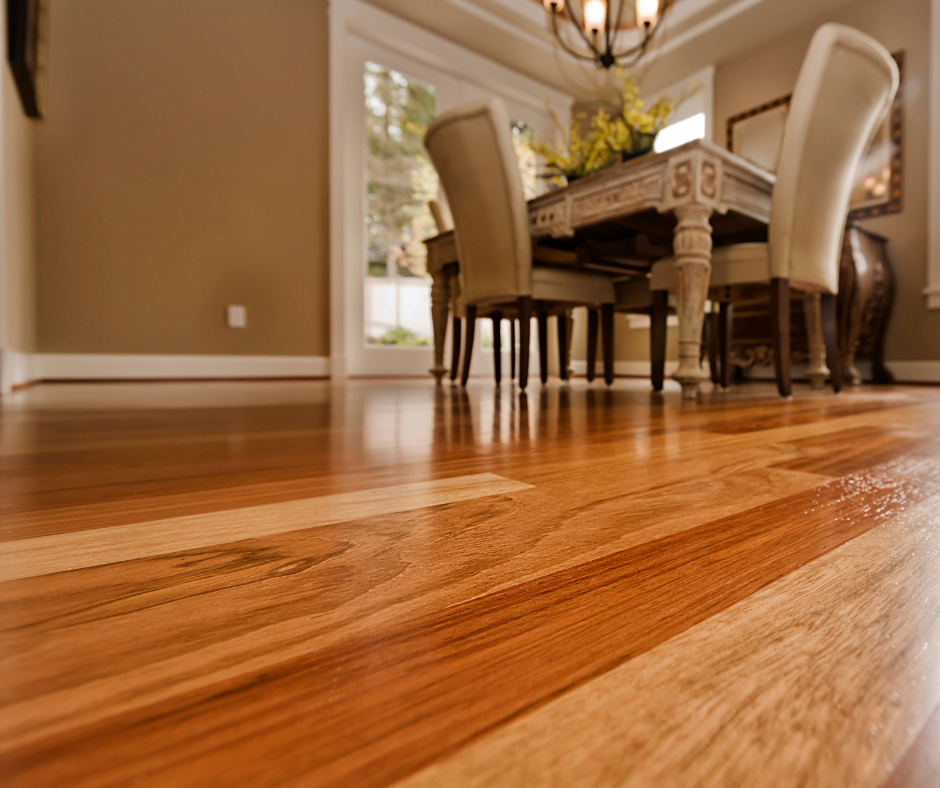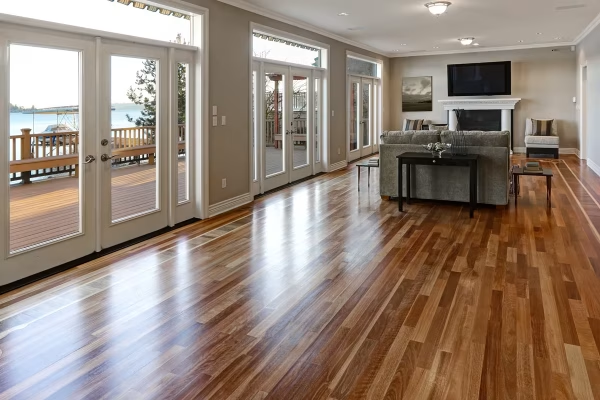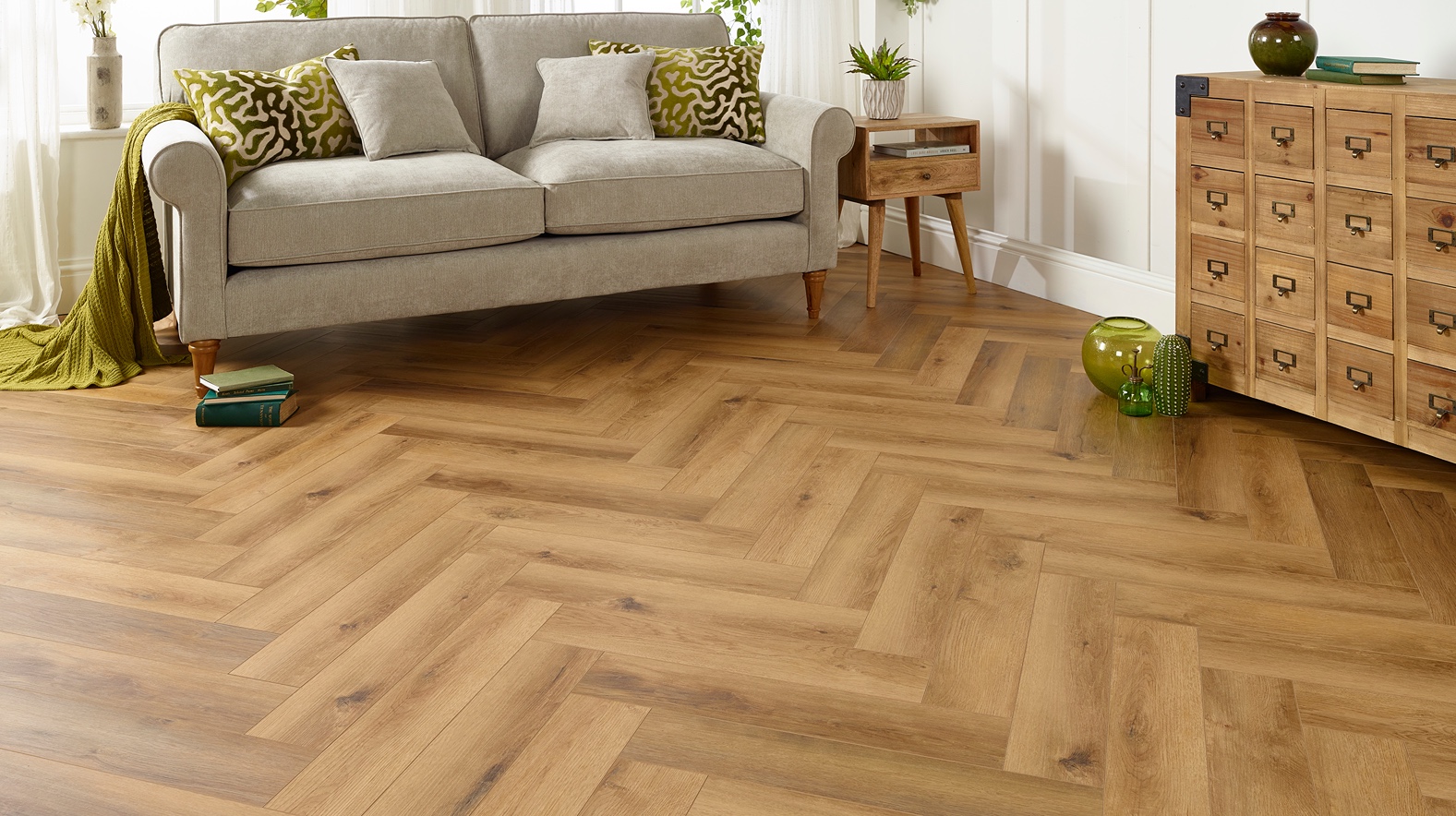
The 8 Vinyl Flooring Trends for 2025
Vinyl flooring continues to evolve, offering homeowners stylish, durable, and versatile options. Here are the top trends shaping vinyl flooring in 2025:
1. Wide Plank Vinyl Flooring
Wide planks create an expansive, seamless look, making rooms feel larger and more luxurious. This trend emphasizes the natural beauty of wood-look vinyl, providing a modern yet timeless appeal.
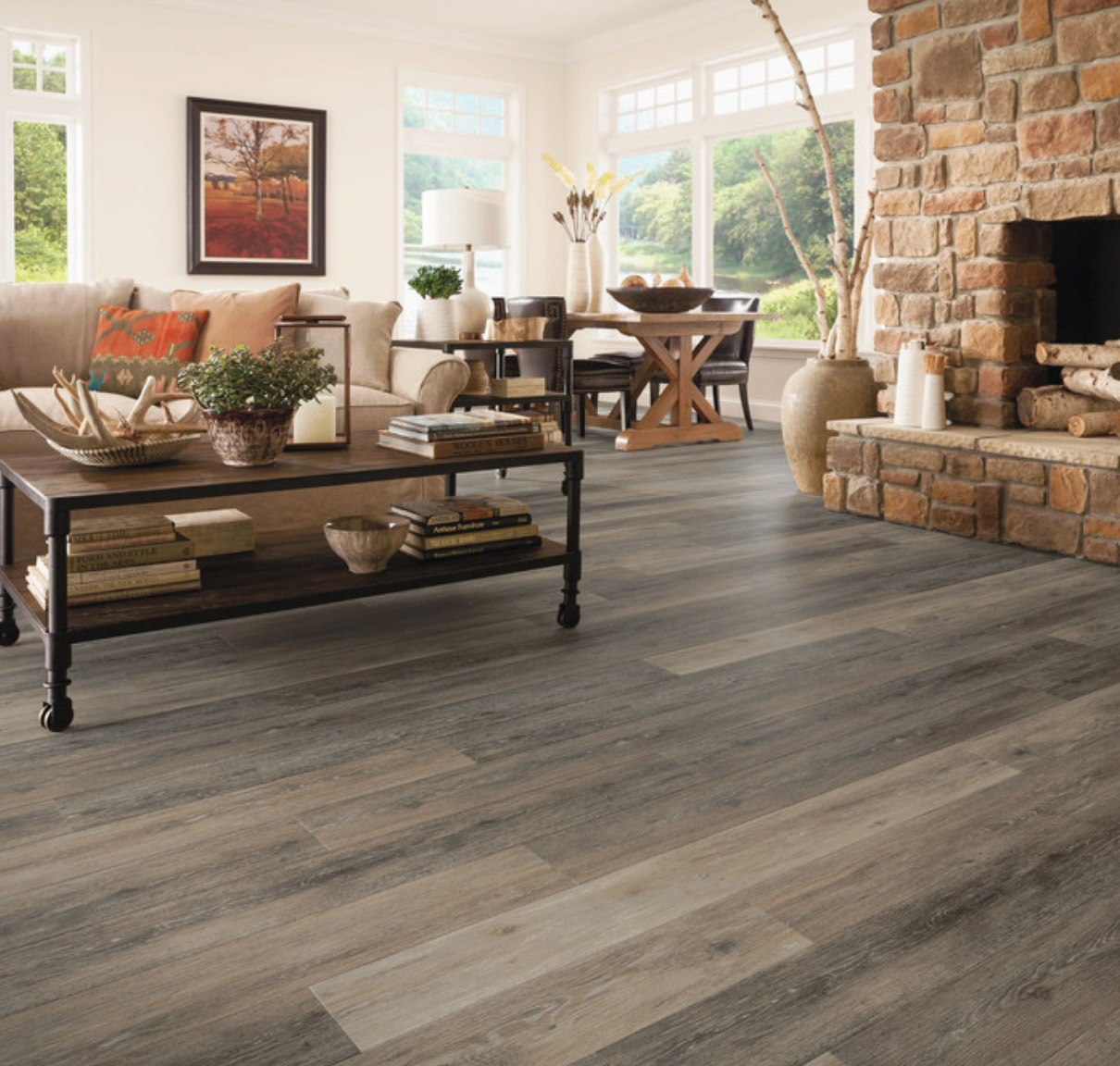
2. Herringbone Patterns
Classic patterns like herringbone and chevron are making a strong comeback, adding visual interest and sophistication to any space. These layouts offer a dynamic aesthetic that complements both traditional and contemporary interiors.

3. Chevron Patterns
Similar to herringbone but with a more angular, directional flow — chevron vinyl is bold, sleek, and on-trend for 2025.

4. Mixed Wood Tones and High Variation Designs
Embracing natural diversity, mixed wood tones and high variation designs bring depth and character to floors. This trend reflects a move towards more organic and eclectic interior styles.
5. Stone-Look Vinyl (Slate, Marble, Travertine)
Vinyl flooring that mimics natural stone like slate, marble, and travertine offers the elegance of stone with the comfort and affordability of vinyl. These designs provide a high-end look suitable for various rooms.
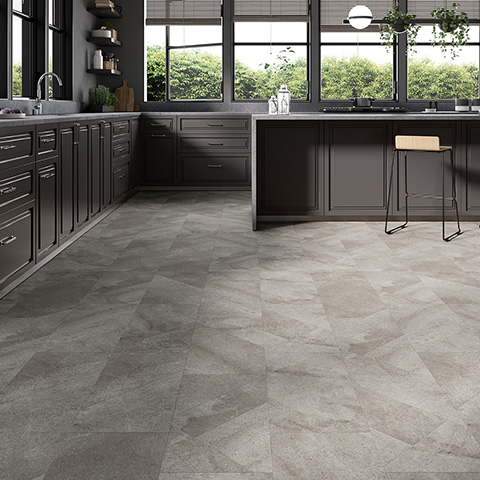
6. Matte Finishes and Low-Sheen Textures
Matte finishes and low-sheen textures are gaining popularity for their ability to hide scratches and dust, offering a sleek and contemporary appearance that requires less maintenance.
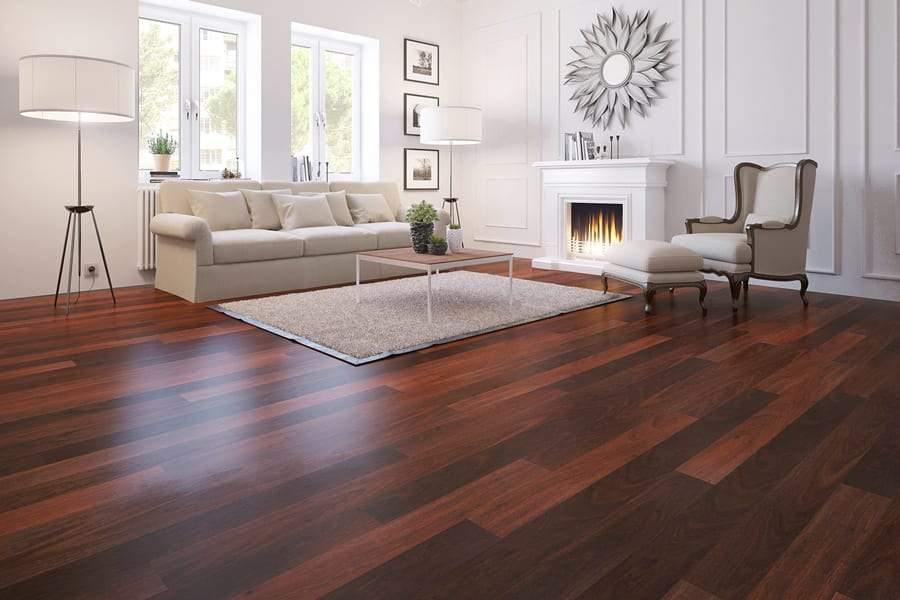
7. Natural Grain Embossing and Registered Finishes
Advancements in printing technology have led to vinyl flooring with realistic textures that match the visual grain, known as registered embossing. This feature enhances the authentic look and feel of wood-look vinyl.

8. Seamless Indoor-Outdoor Transitions with Vinyl Tile
Creating a cohesive look between indoor and outdoor spaces is trending, with vinyl tiles that extend the interior design to patios and decks, offering durability and weather resistance.
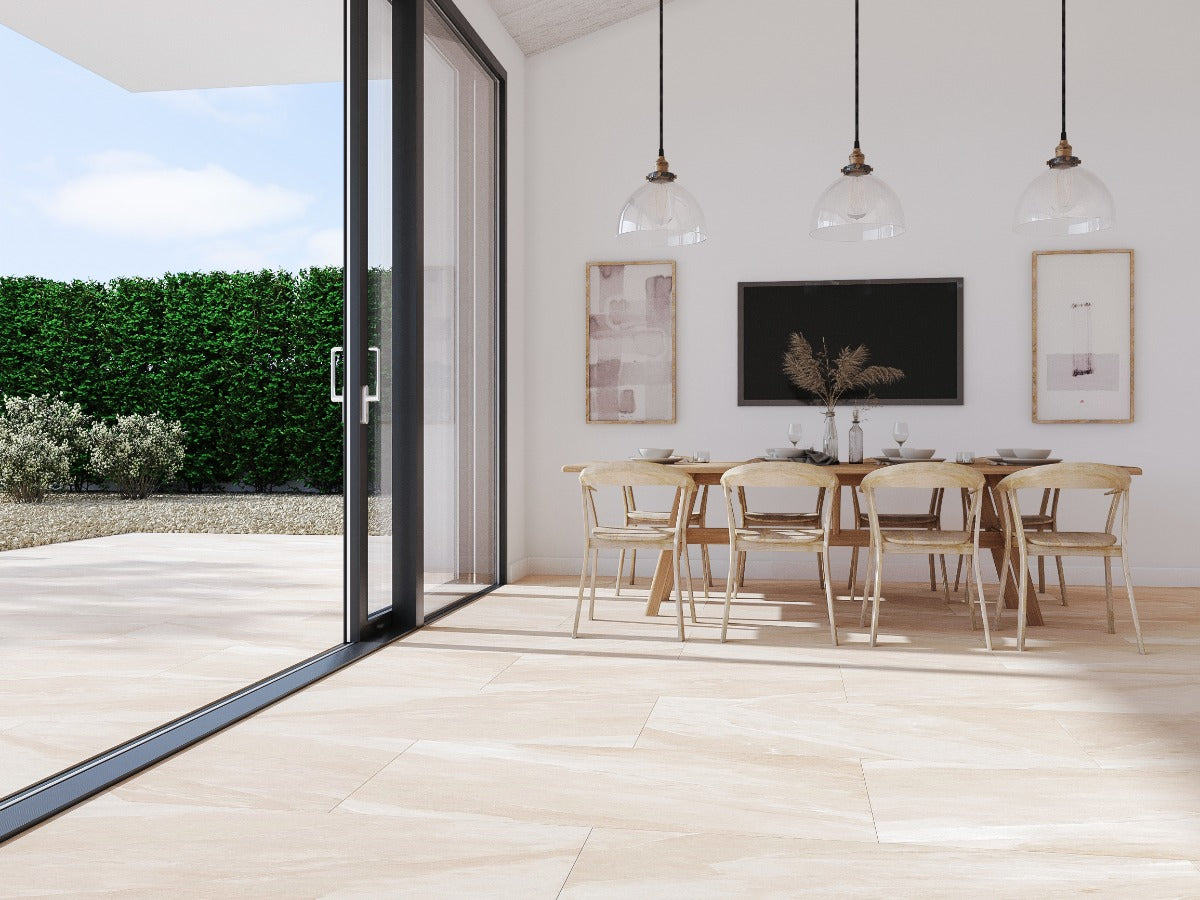
Vinyl Flooring Colors & Finishes Trending Now
In 2025, vinyl flooring color trends are leaning toward warm, nature-inspired tones and richly textured finishes. These colorways and patterns are designed to bring depth, coziness, and visual interest into every room.
🌾 Warm Greige and Honey Oak Tones
A perfect blend of grey and beige, greige vinyl flooring pairs beautifully with modern farmhouse and transitional interiors. Honey oak adds a golden warmth that makes kitchens and living spaces feel inviting and timeless.

🏖️ Coastal Whitewashed Planks
Light, bleached tones inspired by beachy, coastal design are making a strong comeback. These whitewashed vinyl planks brighten small rooms and give off an airy, relaxed feel.

☕ Rich Espresso and Charcoal Tones
For more dramatic interiors, dark tones like espresso and charcoal offer a sleek, high-contrast look that grounds modern design schemes. These colors also help hide dirt in high-traffic areas.

🪵 Distressed and Reclaimed Wood Looks
Vinyl flooring with aged textures and saw-mark details mimics the look of reclaimed barn wood — perfect for rustic, industrial, or eclectic styles. It adds character without the upkeep of real reclaimed materials.

🎨 Subtle Pattern Layering for Depth
Many vinyl collections now feature layered designs — soft wood graining, mineral veining, or tone-on-tone effects — that add richness and visual movement without being overpowering.

Best Vinyl Flooring Types by Room
Choosing the right vinyl flooring tailored to each room ensures optimal performance, durability, and aesthetic appeal.
Kitchens: Waterproof LVP with Slip Resistance
Kitchens are high-traffic areas prone to spills and moisture. Waterproof Luxury Vinyl Plank (LVP) with slip-resistant surfaces offers durability and safety. Its realistic wood or stone visuals enhance the kitchen’s aesthetic while providing a comfortable underfoot feel.

Bathrooms: Sheet Vinyl or Rigid Core Vinyl Tiles
Bathrooms require flooring that can withstand constant moisture. Sheet vinyl provides a seamless, water-resistant surface, while rigid core vinyl tiles offer enhanced durability and a variety of design options.

Living Rooms: Textured Wood-Look LVP
For living rooms, textured wood-look LVP combines the warmth of hardwood aesthetics with the resilience of vinyl. It’s ideal for areas where comfort and style are paramount.
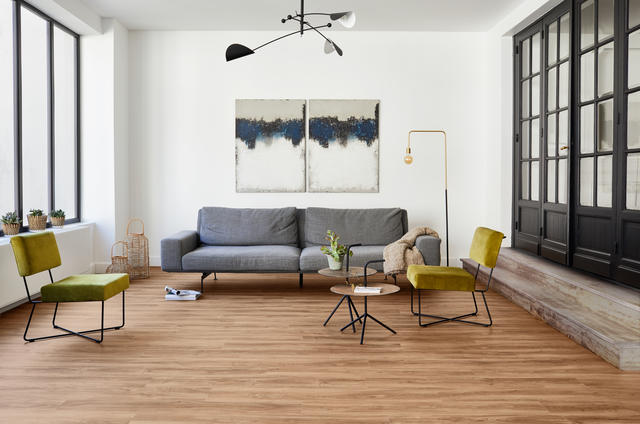
Entryways & Mudrooms: Scratch-Resistant Vinyl Tile
Entryways and mudrooms experience heavy foot traffic and potential dirt ingress. Scratch-resistant vinyl tiles are durable and easy to clean, making them perfect for these transitional spaces.

Rentals: Peel-and-Stick or Click-Lock Vinyl Planks
For rental properties, peel-and-stick or click-lock vinyl planks offer easy installation and removal. They provide a cost-effective solution without compromising on appearance.

Top Reasons to Choose Vinyl Flooring in 2025
Vinyl flooring continues to dominate in 2025 — and for good reason. It’s the go-to choice for homeowners who want modern style, long-lasting performance, and budget-friendly flexibility.
💧 1. Waterproof Durability for Every Room
Whether it’s spills in the kitchen, moisture in the bathroom, or dampness in the basement, vinyl flooring stands up to it all. Most luxury vinyl plank (LVP) and sheet vinyl products are 100% waterproof, making them perfect for high-moisture spaces.
🎨 2. Affordable Style with Luxury Visuals
Vinyl flooring has come a long way. Today’s options include incredibly realistic wood, stone, and tile looks — often with textures that feel as good as they look. You get the high-end aesthetic of hardwood or marble without the steep price tag or upkeep.
🛠️ 3. DIY-Friendly Installation
With click-lock or peel-and-stick formats, many vinyl floors are simple to install without professional help. It’s a smart solution for homeowners who want a weekend makeover or renters looking for removable upgrades.
🦶 4. Cushioned Comfort Underfoot
Unlike ceramic tile or hardwood, vinyl flooring offers a softer, more forgiving surface. Whether you’re cooking for hours or have kids running around barefoot, vinyl adds comfort and warmth underfoot — especially with a padded underlayer.
Vinyl Flooring Cost Breakdown (2025 Estimates)
Vinyl flooring remains one of the most budget-friendly options for stylish, durable floors in 2025. Here’s what you can expect to pay across the most popular types:
💲 Vinyl Flooring Cost Per Square Foot (Materials Only)
| Type | Average Price (2025) | Key Benefits |
|---|---|---|
| Sheet Vinyl | $1 – $3 | Seamless, waterproof, soft underfoot |
| Luxury Vinyl Plank (LVP) | $2 – $5 | Wood-look visuals, waterproof, cushioned |
| Luxury Vinyl Tile (LVT) | $2 – $6 | Stone/tile looks, modular design, durable |
| Rigid Core Vinyl (SPC/WPC) | $3 – $7 | Enhanced stability, dent-resistant, waterproof |
| Peel-and-Stick Vinyl | $1 – $2.50 | Easy DIY, renter-friendly, low-cost fix |
| Click-Lock Vinyl Plank | $2 – $4.50 | DIY-friendly, floating floor, easy to replace |
🛠️ DIY vs. Pro Installation Costs
- DIY Installation: Most vinyl types are designed for homeowners, especially click-lock and peel-and-stick formats. Expect to spend only on underlayment and basic tools.
- Professional Installation: Adds $2–$5 per sq ft, depending on material type, subfloor condition, and room complexity.
⏳ Longevity & Investment Value
- Sheet Vinyl: 10–15 years (great for low-traffic or budget spaces)
- LVP & Rigid Core: 15–25 years (ideal for kitchens, living areas, and moisture zones)
- Peel-and-Stick: 5–10 years (perfect for rentals or short-term upgrades)
👉 Looking for a detailed pricing chart with pros and cons? Check out our full Vinyl Flooring Cost Guide
When to DIY vs. Hire a Pro for Vinyl Flooring Installation
Vinyl flooring is popular for a reason — many styles are designed to be installed without professional help. But depending on the product and the layout of your space, hiring a pro might save you time, stress, and costly mistakes.
Here’s how to decide if you should roll up your sleeves or call in an expert:
🏠 DIY Installation: Best for Simple Spaces & Click Systems
If you’re using click-lock vinyl planks or peel-and-stick tiles, and your room is relatively square without many tricky cuts or doorways, DIY is a great option. These products are engineered for easy installation — even for beginners — and require only basic tools.
You’ll save on labor costs and can work at your own pace, making it perfect for small updates or budget renovations.
🧑🔧 Hire a Pro: Best for Complex Layouts or Permanent Results
Consider hiring a flooring installer if:
- You’re working with glue-down vinyl or sheet vinyl (which can be hard to align or trim correctly)
- Your floor plan includes angles, curves, or multiple rooms
- You need subfloor repair or leveling
- You want a warranty-backed, guaranteed result
Professionals also bring specialized tools that ensure the best adhesion, cuts, and transitions — which leads to a longer-lasting finish.
📊 DIY vs. Pro Installation Comparison
| Factor | DIY Installation | Professional Installation |
|---|---|---|
| Best For | Click-lock, peel-and-stick vinyl | Glue-down vinyl, sheet vinyl, complex layouts |
| Skill Level Required | Beginner to intermediate | None — handled by trained pros |
| Tools Needed | Utility knife, straightedge, mallet | Industrial cutters, rollers, glue tools |
| Prep Work | Homeowner must prep and clean subfloor | Installer handles subfloor leveling |
| Time Commitment | 1–2 days for most rooms | Usually completed in one day |
| Warranty Coverage | Often voided if not installed correctly | Manufacturer warranties typically valid |
| Average Install Cost | $0 (DIY) + tools (~$50–$100) | $2–$5 per square foot labor cost |
✅ Quick Tip
If your vinyl flooring requires glue or precise edge-to-edge alignment — and you want a flawless result — it’s worth investing in a pro installer.
👉 Need help with vinyl flooring installation? Check out our full How to Install Vinyl Flooring (DIY Guide) or Book a Free In-Home Consultation with our flooring experts.
Final Tips Before You Buy Vinyl Flooring
Before placing your order, take a few extra steps to make sure your vinyl flooring investment pays off — both in looks and long-term performance.
📦 Order Extra for Cuts & Waste
Always buy 10–15% more vinyl flooring than your room’s square footage. This covers edge cuts, mistakes, and leaves spare planks for future repairs — especially important for patterns like herringbone or large-format tiles.
💡 Test Samples in Home Lighting
Vinyl can look very different under store lighting vs. your kitchen or living room. Lay samples flat on your floor and observe them throughout the day under both natural and artificial light. This helps avoid unwanted color surprises after installation.
🛡️ Review Warranties & Wear Layer Specs
Check the wear layer thickness (measured in mils) — 12 mil or higher is best for high-traffic areas. Also confirm the manufacturer warranty covers water damage, fading, and installation errors. Some warranties require pro installation to remain valid.
💰 Consider Lifetime Value, Not Just Upfront Price
A cheaper floor may look good at first but wear out in a few years. Spend a little more on rigid core LVP or higher-end brands and enjoy 15–25 years of low-maintenance durability. It’s an investment that saves you money long term.
Need Help Choosing or Installing Your Vinyl Flooring?
Now that you’ve explored the latest vinyl flooring trends, material types, and cost breakdowns, you’re one step closer to upgrading your home with beautiful, durable floors. But if you’d prefer to skip the guesswork, measuring, and heavy lifting, our expert team is here to help.
We handle everything — from subfloor inspection and layout planning to the precise installation of luxury vinyl plank, sheet vinyl, vinyl flooring stairs, vinyl floor tiles and more.
We’ll also guide you in choosing the perfect vinyl style and format for your room, budget, and lifestyle — whether you’re outfitting a busy kitchen, bathroom, or rental property.
Click here to contact us today and schedule your free in-home consultation to see if we serve your area!


